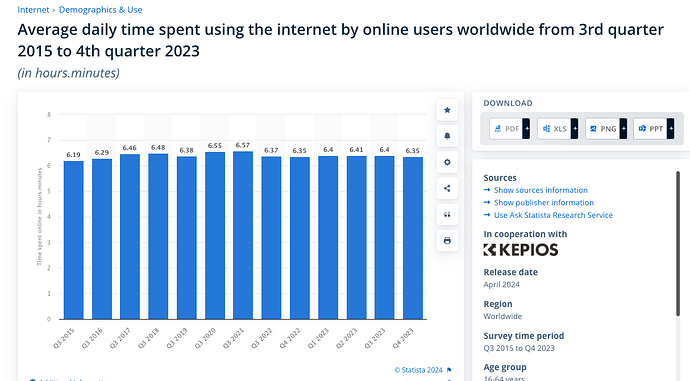"It is virtue’s use to raise the general level of nature toward the better and finer, above the mass of men. And the finer is set at naught what terrifies the common mind.
We cannot be indolent; this is an arena for the powerful combatant holding his ground against the blows of fortune and knowing that, sore though they be, they are little to him, nothing dreadful, nursery terrors. It is precisely to meet the undesired when it appears that he has the virtue to give him, to confront it, his passionless and unshakeable soul.
Thus he is ever cheerful, and the order of his life untroubled; his state is fixedly happy and nothing whatever of all that is known as evil can set it awry."
From “True Happiness”, by Plotinus, Greece, 205-270 A.D., translated to latin by Marsilio Ficino, 1492
In the 3rd Quarter of 2021, the inexorably-increasing health of the ether broke the back of technology addiction, as internet use decreased internationally for the first time since its inception thirty years previously in 1991, when a generational Satanist Freemason from CERN named Tim Berners-Lee created the World Wide Web.
In 1962, per history.com, J.C.R. Licklider, a scientist from the Department of Defense’s Advanced Research Projects Agency (ARPA) proposed an “intergalactic network” of computers which could talk to one another, and enable government leaders to communicate even if the Soviets destroyed the telephone system.
Here’s J.C.R. Licklider’s picture, where the image is constructed to focus attention on his left eye:

(J.C.R. Licklider)
In 1965, Donald Davies, a scientist at Britain’s National Physical Laboratory developed a way of sending information from one computer to another that he called “packet switching.” Packet switching breaks data down into blocks, or packets, before sending it to its destination. That way, each packet can take its own route from place to place. Without packet switching, the government’s computer network—now known as the Arpanet—would have been just as vulnerable to enemy attacks as the phone system.
Here’s Donald Davies’ picture, where the image is constructed to focus attention on his left eye:

(Donald Davies)
On October 29, 1969, Arpanet delivered its first message: a “node-to-node” communication from one computer to another, on October 29, 1969. The first computer was located in a research lab at UCLA and the second was at Stanford; each one was the size of a large room.) The message—“LOGIN”—was short and simple, but it crashed the fledgling Arpanet anyway: The Stanford computer only received the note’s first two letters.
in 1991, a computer programmer working at the CERN research center on the Swiss-French border named Tim Berners-Lee introduced the World Wide Web: an internet that was not simply a way to send files from one place to another but was itself a “web” of linked information that anyone on the Internet could retrieve. Berners-Lee created the Internet that we know today.
Here’s Tim Berners-Lee’s picture, where the image is constructed to focus attention on his left eye:

(Tim Berners-Lee)
The images are all constructed to focus attention on their left eyes because, to generational Satanist Freemasons like these three literally-blood-drinking internet pioneers, the left eye is the “eye of Will” or the “eye of Horus”.
They do their blood drinking way on the down low, by the way, on special occasions. It’s not like they bring it to the cafeteria at work.
But don’t take my word for it:
‘The right eye is the Eye of Ra and the left is the Eye of Horus’.”
From “Freemasonry - Religion And Belief - The 3rd Temple”
Facebook: “Welcome to the Left-Hand-Path-Network, where Satanism is not about worship, but it’s study.”
I have included these pictures so that you could get a better idea of Evil Scientists actually look like.
They figured that the rubes would never notice the coded visual imagery.
It’s not like these people aren’t right up front about what they’re doing, and what they’re into.
We’ve just been conditioned, over literally Millennia, not to “notice” it.
Generational Satanists are all related to one another through the maternal bloodline. They comprise between twenty and thirty percent of the populace, and are hiding in plain sight in every city, town and village on Earth.
It’s how the few have controlled the many all the way back to Babylon, and before.
But they say that the hardest part of solving a problem is recognizing that you have one.
Don Croft used to say “Parasites fear exposure above all else”.
How long do you think that these people have left in power, now?
Please consider doing what you can to help speed the transition.
In 1995, just 14 percent of U.S. adults used the internet.

(The Internet in 1995)
By 2005, two thirds of adults in the United States used the internet.
From 2012 to the 3rd Quarter of 2021, average internet use increased by 363%, or by well more than four times, from 1 hour and 30 minutes per day to an all-time high 6 hours and 57 minutes per day.
In 2012, the average person accessed the internet for 90 minutes per day.
From the 3rd Quarter of 2015 to the 3rd Quarter of 2021, the average daily time spent using the internet by online users worldwide increased by 10%, from 6 hours and 19 minutes to an all-time high 6 hours and 57 minutes.
From the 3rd Quarter of 2015 to the 3rd Quarter of 2021, the average daily time spent using the internet by online users worldwide increased by an annual average of 1.4%.
In the 3rd Quarter of 2015, the average daily time spent using the internet by online users worldwide was 6 hours and 19 minutes.
From the 3rd Quarter of 2019 to the 3rd Quarter of 2021, the 2.5% average annual increase in the average daily time spent using the internet by online users worldwide was 78.5% greater, or nearly double its 1.4% average annual increase from the 3rd Quarter of 2015 to the 3rd Quarter of 2021.
Here, from late 2019 to late 2021, we see the sick peak of internet use in our civilization.
From the 3rd Quarter of 2019 to the 3rd Quarter of 2021, the average daily time spent using the internet by online users worldwide increased by 4.8%, from 6 hours and 38 minutes to 6 hours and 57 minutes.
From the 3rd Quarter of 2019 to the 3rd Quarter of 2021 the average daily time spent using the internet by online users worldwide increased by an annual average of 2.4%.
In the 3rd Quarter of 2019, the average daily time spent using the internet by online users worldwide was 6 hours and 38 minutes.
From the 3rd Quarter of 2021 to the 4rd Quarter of 2023, the average daily time spent using the internet by online users worldwide decreased by 5.3%, from an all-time high 6 hours and 57 minutes to 6 hours and 35 minutes.
From the 3rd Quarter of 2021 to the 4rd Quarter of 2023, the average daily time spent using the internet by online users worldwide decreased by a quarterly average of .6%.
In the 3rd Quarter of 2021, the average daily time spent using the internet by online users worldwide was an all-time high 6 hours and 57 minutes.
In the 3rd Quarter of 2021, the inexorably-increasing health of the ether broke the back of technology addiction, as internet use decreased internationally for the first time since its inception over fifty years previously in 1969.
From the 3rd Quarter of 2023 to the 4th Quarter of 2023, the 1.3% decrease in the average daily time spent using the internet by online users worldwide was 117% greater, or more than twice as great as its .6% average quarterly decrease from its all-time high in the 3rd Quarter of 2021 to the 4th Quarter of 2023.
The great positive societal change is increasing exponentially, going forward in time.
That’s because the health of the ether is inexorably increasing, and moral and mental health vary directly with that of the subject’s etheric environment.
From the 3rd Quarter of 2023 to the 4th Quarter of 2023, the average daily time spent using the internet by online users worldwide decreased by 1.3%, from 6 hours and 40 minutes to 6 hours and 35 minutes.
In the 3rd Quarter of 2023, the average daily time spent using the internet by online users worldwide was 6 hours and 40 minutes.
In the 4th Quarter of 2023, the average daily time spent using the internet by online users worldwide was 6 hours and 35 minutes.
THE ARTICLES
APRIL 2024
On April 30, 2024, statista.com published “Average daily time spent using the internet by online users worldwide from 3rd quarter 2015 to 4th quarter 2023”, by Ani Petrosyan.
Here’s a screenshot of it:
(Average daily time spent using the internet by online users worldwide from 3rd quarter 2015 to 4th quarter 2023)
I have analyzed this data at the top of this article.
Jeff Miller, Honolulu, HI, June 20, 2024
If you’d like to be added to this free mailing list, please send me a note at [email protected].
